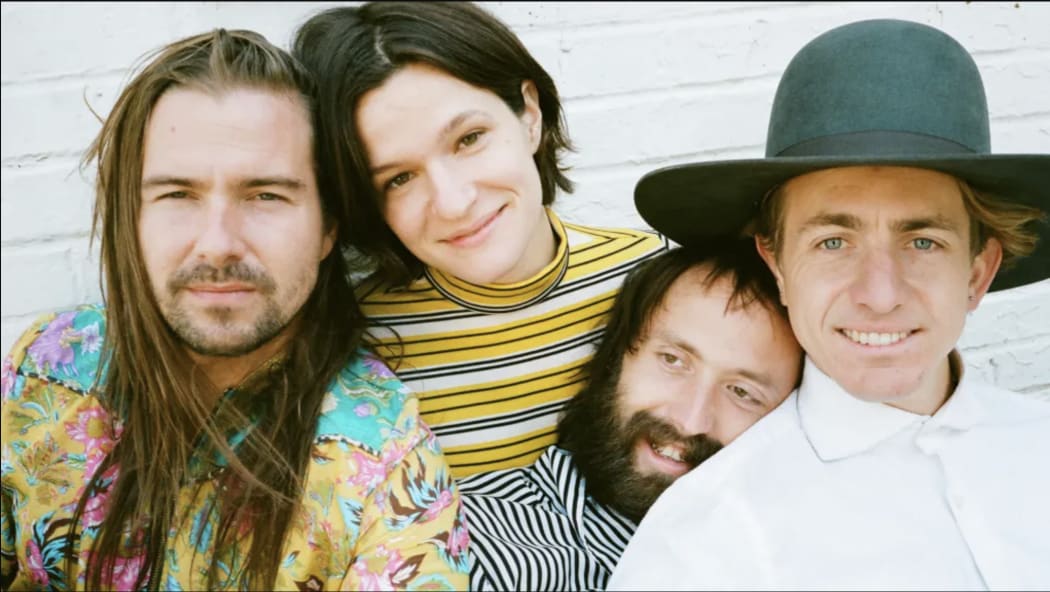Tony Stamp reviews a lengthy new album by prolific folk-rockers Big Thief, an experimental set from Mutton Bird-turned-screen-composer David Long, and takes a look back at the second album by seventies funk legend Betty Davis, who died earlier this year.
Dragon New Warm Mountain I Believe In You by Big Thief

Big Thief Photo: supplied
I used to wonder if creativity had a time limit. So many bands seemed to be good for one album then run out of steam, but the spate of reunions and resurgences over the last decade have proved that in some cases, it’s always there.
The band Big Thief debuted in 2016, and have just released their fifth album. Two of those came out in 2019, the drummer released a solo record the following year, the singer released two, and the year after that the guitarist released his second.
And despite this voluminous creative outpouring, they still have plenty left in the tank. The latest features a whopping twenty songs, clocking in at eighty minutes. Dragon New Warm Mountain I Believe in You seems like a fittingly unwieldy title.
Big Thief are ostensibly an indie folk band, but flirt with country, rock and experimental forms - shaking up their format in ways you’d hope for.
‘No Reason’ is the only one to feature flute, but they make the most of the pastoral quality it gives the song. On ‘Time Escaping’ I wasn’t even sure what instruments I was hearing, but research tells me its strange percussive sounds come from ‘prepared acoustic guitars’ - basically acoustics with things stuck in them to change their timbre.
Then there are numbers like ‘Spud Infinity’ which have real ‘yeehaw’ energy, down to the inclusion of a twanging jaw harp.
Given Big Thief’s sound, you may be surprised that they originated in Brooklyn. They’re led by Adrianne Lenker, who sings lead and writes all the songs, and seems to have music in her veins; as mentioned she released two solo albums not that long ago, and in the sessions for this album the band fully recorded forty five songs, and then whittled them down.
Lenker has a knack for quietly devastating tunes, not necessarily sad ones, just… emotional. On ‘Sparrow’ she seems to be reclaiming the story of Eden; after Eve eats the apple, Adam accuses her of having poison inside her, and being guided by snakes.
This is the first Big Thief album to be produced by their drummer James Krivchenia, who arranged for the band to record at four different studios, with a different sonic goal in mind for each. These do sound like tracks that tumbled out directly onto the record - there’s studio chatter and behind the scenes noodling, and a pleasantly ‘unfinished’ feel to some of them - but you can hear the planning that’s gone into it all too.
On ‘Blurred View’ for example, the hushed folk band is gone, replaced with synth and dualling distorted drum kits, but it’s still slightly shambolic - or in other words, human.
Eighty minutes is a lot of album, and if I had to criticise, I’d say some tracks near the end run the risk of feeling samey, or less than, but maybe they’ll work their charm on me eventually.
A highlight of the second half is ‘Simulation Swarm’, a breezy folk number with lyrics counterintuitively full of nightmarish imagery; verse after verse of the kind of immaculately written prose that Lenker seems to exude. Hers is a creative well that may never run dry, and this album is full of songs that are heartbreaking, uplifting, scary, and amusing - often all at once.
Ash & Bone by David Long

David Long Photo: supplied
A few weeks ago I reviewed the debut solo album by Karl Steven of Supergroove, whose work these days is mainly focused on screen composition. It’s a career move other bands and artists have followed, which I imagine presents a whole new set of challenges.
David Long was a founding member of the Mutton Birds, and has produced albums for the likes of Dave Dobbyn and Fur Patrol, and over the last few decades composed music for a variety of projects like Peter Jackson movies, contemporary dance pieces, and the BBC series The Luminaries, for which he won Best Score at the Silver Scroll awards.
His latest album certainly sounds cinematic, but isn’t attached to any pictures. Except maybe the ones in his mind.
Prior to recording Ash and Bone, Long said he was listening to a lot of Bollywood and electronic music, and found their influence had rubbed off on these pieces. The electronic part of that equation is the most apparent, like the soaring synth on ‘The Long Long Walk’.
On Long’s website an effort is made to classify the album, throwing out alt-chamber music, experimental instrumental and others. I might suggest ‘neo-classical’. The album pairs Long on banjo, guitar, and electronics, with wind instruments, brass and harp.
He said he wanted to pair the beauty and skill of those musicians with his love of broken or ‘munted’ sounds.
On ‘Underground’ that means various furtive parps, melodious flute, and underneath, Long’s slightly menacing guitar jangle, with percussionist and electronic musician Rikki Gooch supplying drums.
On the title track ‘Ash and Bone’, a beeping sine wave merges with wind instruments, and if you listen closely, you can hear him digitally manipulating them too, creating a stutter effect.
Ash and Bone is a challenging listen: it’s much more interested in atmosphere than dispensing hummable hooks. But I’ve enjoyed its delicate, slightly uneasy pathways. There’s a purity to David Long’s creation, what he calls ‘a space between acoustic and electronic worlds’.
It also sounds like it was fun to make, especially the boisterous ‘Wash Your Mouth Out’. Listening to it, I could almost hear the musical ties between Long’s former band The Muttonbirds, and this ambitious set of compositions.
They Say I’m Different by Betty Davis

Betty Davis Photo: supplied
Betty Davis died on February 9th 2022 at the age of 77.
In the late ‘60s she spent a year as wife of jazz legend Miles Davis, in the process introducing him to Jimi Hendrix and Sly Stone, and she’s considered an influence on his 1970 album Bitches Brew, which pioneered jazz-fusion. Apparently Miles called it 'Witches Brew', but Betty convinced him to change it.
Her debut solo album - the first of four - came out in 1973. Her releases didn’t sell that well, until the late 2000s when they were reissued by Light in the Attic records. And now following her death, there’s another wave of people discovering Betty Davis’ music, and realising how ahead of her time she was.
In his 1990 biography, Miles Davis credited her as a precursor to Madonna and Prince. He said “she was the beginning of all that”.
Her music was undeniably sexual, not just lyrically but musicially. Popmatters put it in appropriately ribald terms, describing her first self-titled album as "a slow cooker of unbridled lust that teases and passes each beat, and flicks and licks each chord."
In 1974 she released her second album, with the self-aware title They Say I’m Different. Apparently it was Marc Bolan of T Rex who had encouraged Betty to write her own tracks, and for this release she was empowered enough to produce, too.
Songs like ‘He Was a Big Freak’ retain her reputation for eyebrow-raising lyrics. In it she describes the personas she took on for her lover, including tying him up and whipping him with her chain. Over the years theories have abounded over who she’s describing, but Betty never said.
The sex-positivity continues on ‘Don’t Call Her no Tramp’. It’s not clear whether Betty is describing a sex-worker, or a friend who hasn’t settled down, but regardless, when she and her backup singers repeatedly bellow that title, the message is clear.
Betty Davis’ music gets compared to Sly & the Family Stone, for obvious reasons, but it has a rambunctious energy that’s all hers. And because she wrote these songs, she’s left herself room to vamp, putting her voice through all sorts of tonsil-shredding exercises.
On ‘Git In There’, an ode to the simple pleasure of partying, you can hear her move away from the mic when she howls the title. Presumably the volume was just too much.
In the liner notes to the reissue of Betty Davis’ debut, Carlos Santana is quoted as saying: “Madonna is more like Marie Osmond compared to Betty. [She] was a real ferocious Black Panther woman. You couldn't tame [her]”.
Her third album Nasty Gal came out in 1975, and she recorded one more in 1976 called Is It Love Or Desire, which didn’t see the light of day till 2009. Betty Davis quietly withdrew from the spotlight, and spent around 40 years living anonymously in Pittsburgh. She was famously hard to track down, and refused to comment on her disappearance, simply saying that time in her life had passed.
But her influence on funk and the generations of performers since then is undeniable. And newcomers to her music will be treated to albums that have a rare force of personality, from someone who really was one of a kind.

